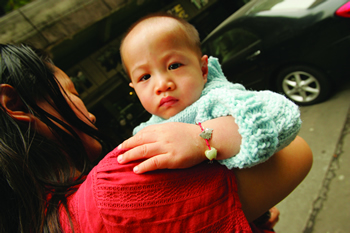Social Support and Psychosocial Distress Among Children Affected by AIDS in China
October 2009–An estimated 100,000 children orphaned by AIDS are believed to be living in China. However, research on the psychosocial well-being and the social support needs of these children has been limited. A recent study was conducted to examine the relationship between social support and psychosocial well-being of children (aged 6–18) living in Henan, China, a rural province where large numbers of people became infected with HIV after exposure to contaminated blood products in the late 1980s to mid-1990s.1

An HIV-positive child in China. (Photo: Carl Grobl) |
Surveys were completed by 404 children who had not experienced HIV-related illness or death in their families, 466 children living with HIV-infected parents, and 755 orphans who had lost one or both of their parents to HIV. None of the children had HIV themselves. The survey contained questions about emotional support from family, friends, and teachers, as well as questions about psychosocial aspects of life, such as loneliness, self-esteem, and perceived control over the future.
The researchers found that children who felt they had higher levels of social support also reported lower levels of depression and loneliness and higher levels of self-esteem, perceived control over their futures, social skills, and interest in attending school. Older children, orphans, and girls reported feeling higher levels of social support than other children. While higher levels of family support were reported by orphans who had lost one parent compared to children who had lost both parents, the study showed similar levels of psychosocial problems between the two groups.
Notably, children whose HIV-infected parents were still alive reported lower levels of social support. Possible reasons for this include fewer government-sponsored programs for nonorphan children, the stress of having chronically ill caregivers, and the stigma associated with having HIV-positive parents.
This study emphasizes the importance of social support programs for children affected by HIV. These programs can have a significant impact on reducing mental and emotional stress in the lives of these children and improving their hope for a stable future.
1 Hong, Y. et al. Perceived social support and psychosocial distress among children affected by AIDS in China. Community Mental Health Journal, 17 June 2009. (Epub ahead of print)
TRANSLATIONS > Chinese [pdf]